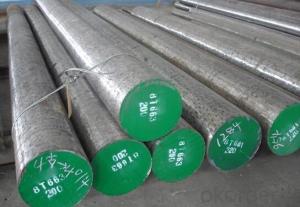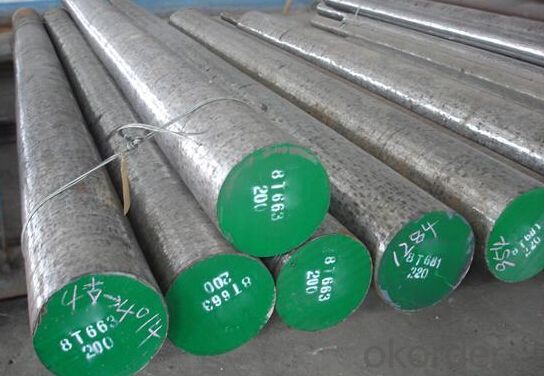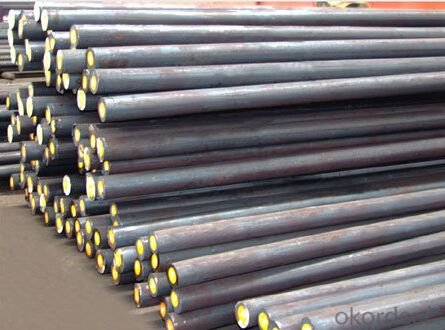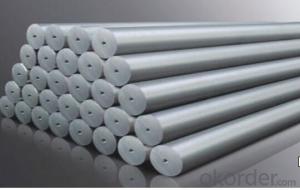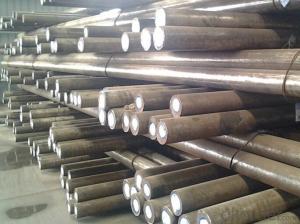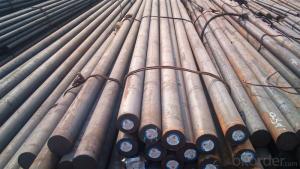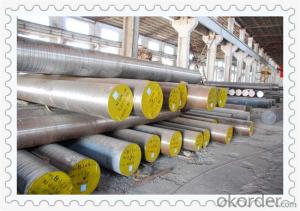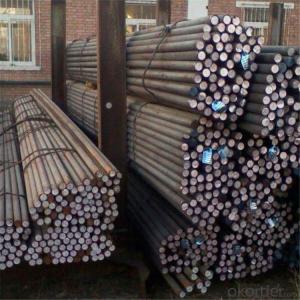Grade SAE 5140 alloy steel round bars Hot Rolled
- Loading Port:
- Tianjin
- Payment Terms:
- TT OR LC
- Min Order Qty:
- 3 m.t.
- Supply Capability:
- 10000 m.t./month
OKorder Service Pledge
OKorder Financial Service
You Might Also Like
Specification
Product Description:
OKorder is offering Grade 5140 alloy steel round bar at great prices with worldwide shipping. Our supplier is a quality manufacturer of steel, with our products utilized the world over. OKorder annually supplies products to European, North American,African and Asian markets..etd. We will quote you our most competitive prices within 24 hours after received the inquiry and guarantee the quality.
Product Applications:
Grade SAE51200/ GCr15 / 100cr6 Bearing Steel are ideal for structural applications and are widely used in the
Gear, Sleevesspool,Shaft, Crankshaft, Pin
Product Advantages:
OKorder's Grade SAE5140 alloy steel are durable, strong, and resist corrosion.
Chemical Composition
Grade | C | Si | Mn | Cr | Ni | Cu | P | S |
40Cr | 0.37-0.44 | 0.17-0.37 | 0.50-0.80 | 0.80-1.10 | ≤0.30 | ≤0030 | ≤0.035 | ≤0.035 |
41Cr4 | 0.38-0.45 | ≤0.40 | 0.60-0.90 | 0.90-1.20 | ≤0.030 | ≤0.030 | ≤0.035 | ≤0.035 |
5140 | 0.38-0.43 | 0.17-0.37 | 0.70-0.90 | 0.70-0.90 | ≤0.030 | ≤0.030 | ≤0.040 | ≤0.035 |
Mechanical Properties
Grade | Tensile Strengthσb (MPa) | Yield Strength | Elongation | Reduction of Area ψ (%) | Impact Akv(J) | Hardness |
|
| |||||
σs (MPa) | δ5 (%) | |||||
5140 | ≥980(100) | ≥785(80) | ≥9 | ≥45 | ≥47 | ≤207HB |
Packaging & Delivery
Standard seaworthy packing or as customer required
Leadtime
Delivery time: Within 30 days after order is confirmed.
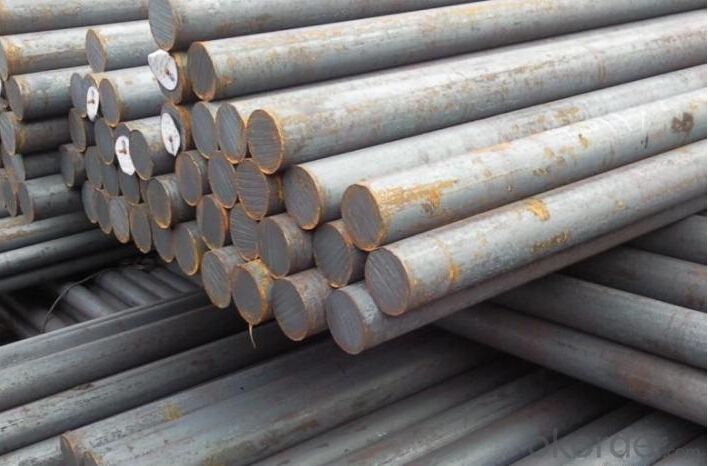
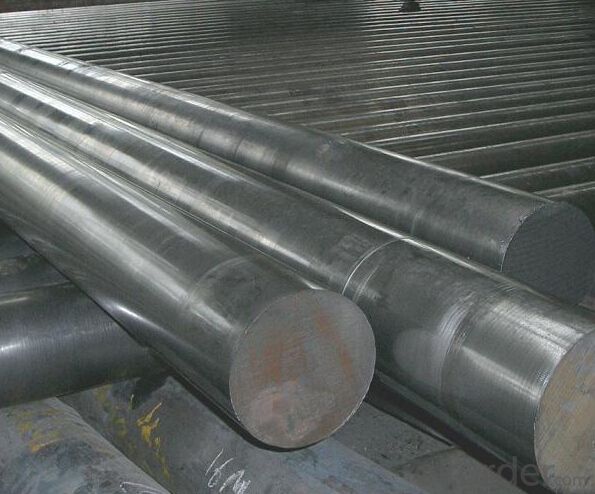
- Q: How does special steel contribute to the telecommunications aftermarket industry?
- Special steel plays a crucial role in the telecommunications aftermarket industry by providing the necessary materials for the manufacturing and maintenance of various telecommunications equipment. This type of steel is specifically designed to possess exceptional properties, such as high strength, corrosion resistance, and durability, which are essential for the demanding conditions of the telecommunications sector. One of the main contributions of special steel to the telecommunications aftermarket industry is its use in the production of communication towers and transmission structures. These structures need to withstand extreme weather conditions, including strong winds and heavy loads, while also providing reliable support for antennas and other equipment. Special steel is capable of meeting these requirements, ensuring the longevity and stability of communication towers. Furthermore, special steel is extensively used in the manufacturing of cables and wires used in telecommunications systems. These cables need to transmit signals without any loss or interference, and the unique properties of special steel, such as high electrical conductivity and low resistance, make it an ideal material for this purpose. The use of special steel in cables helps maintain the quality and efficiency of telecommunications networks. Another significant contribution of special steel is in the production of equipment enclosures and cabinets. These enclosures provide protection to sensitive electronic components from environmental factors, such as moisture, dust, and extreme temperatures. Special steel, with its corrosion-resistant properties, ensures the longevity and reliability of these enclosures, safeguarding the valuable equipment inside. Moreover, special steel is also utilized in the manufacturing of various components and accessories used in the telecommunications aftermarket industry. These include connectors, brackets, and hardware, which are essential for assembling and maintaining telecommunications equipment. Special steel's high strength and durability make it a preferred choice for these components, ensuring their long-lasting performance. In conclusion, special steel contributes significantly to the telecommunications aftermarket industry by providing the necessary materials for the manufacturing and maintenance of various telecommunications equipment. Its exceptional properties, including high strength, corrosion resistance, and durability, make it an ideal choice for communication towers, cables, enclosures, and various components. By utilizing special steel, the telecommunications industry can ensure the reliability, efficiency, and longevity of its equipment, ultimately benefiting both service providers and end-users.
- Q: How are titanium alloys used in the medical industry?
- Titanium alloys are widely used in the medical industry due to their excellent biocompatibility, corrosion resistance, and high strength-to-weight ratio. These alloys are used for various medical applications such as implants, surgical instruments, and medical equipment. They are often used in orthopedic implants, dental implants, and cardiovascular devices, as they provide long-term stability and compatibility with the human body. Additionally, titanium alloys are highly resistant to bodily fluids and can withstand harsh sterilization processes, making them ideal for use in the medical field.
- Q: How does special steel contribute to the agricultural sector?
- Special steel contributes to the agricultural sector in several ways. Firstly, special steel is known for its strength and durability, making it an ideal material for manufacturing various agricultural machinery and equipment. This includes tractors, plows, harvesters, and irrigation systems, among others. These machines require robust and reliable components that can withstand the demanding conditions of agricultural work, and special steel provides the necessary strength and resistance to wear and tear. Additionally, special steel can be used to produce high-quality cutting tools that are essential in farming operations. Implements such as sickles, scythes, and pruning shears need to have sharp and durable blades to efficiently cut through vegetation. Special steel's hardness and strength make it a suitable material for manufacturing these tools, ensuring they retain their sharpness even after prolonged use. Furthermore, special steel can contribute to the agricultural sector by enabling the construction of sturdy and durable infrastructure. Agricultural buildings, storage facilities, and fencing often require strong and corrosion-resistant materials to withstand the elements and protect crops, livestock, and equipment. Special steel, with its resistance to rust and structural integrity, can be used in the construction of barns, silos, sheds, and fencing, providing long-lasting and reliable structures. In conclusion, special steel plays a crucial role in the agricultural sector by providing the necessary strength, durability, and corrosion resistance required for the manufacturing of machinery, cutting tools, and infrastructure. Its properties contribute to improved efficiency, productivity, and reliability in agricultural operations, ultimately benefiting farmers and the overall agricultural industry.
- Q: How does electrical steel minimize energy losses in electrical devices?
- Electrical steel minimizes energy losses in electrical devices through its unique magnetic properties and composition. It is specifically designed to have low magnetic hysteresis and eddy current losses, resulting in reduced energy dissipation and improved overall efficiency. The grain-oriented structure of electrical steel aligns the magnetic domains along a specific direction, allowing for efficient magnetic flux flow and minimizing energy losses. Additionally, the thin insulation coating on electrical steel further reduces eddy currents, ensuring minimal power wastage and maximizing the performance of electrical devices.
- Q: Can special steel be used in the production of jewelry?
- Yes, special steel can be used in the production of jewelry. While precious metals like gold, silver, and platinum are commonly used in jewelry making, there is also a growing trend towards using unconventional materials such as special steel. Special steel, with its unique properties like durability, strength, and corrosion resistance, can be crafted into beautiful and intricate designs that cater to a more contemporary and edgy aesthetic. Additionally, special steel jewelry is often more affordable than traditional precious metal jewelry, making it a popular choice for those seeking a unique and budget-friendly option. However, it is important to note that special steel jewelry requires proper care and maintenance to prevent tarnishing and scratching.
- Q: Is special steel suitable for medical equipment manufacturing?
- Indeed, medical equipment manufacturing is well-suited for special steel. Often referred to as stainless steel, special steel is widely utilized in the creation of medical equipment due to its distinct characteristics. Its exceptional resistance to corrosion is of utmost importance in maintaining the hygiene and cleanliness standards mandated in medical settings. Moreover, special steel boasts remarkable strength and durability, guaranteeing that the equipment can endure frequent use and sterilization processes without compromising its quality. Furthermore, special steel can be effortlessly molded and shaped into intricate designs, making it an ideal choice for fabricating complex medical instruments and devices. In summary, the utilization of special steel in medical equipment manufacturing ensures the production of dependable and enduring products that meet the rigorous requirements of the healthcare industry.
- Q: What are the different methods of analyzing the microstructure of special steel?
- There are several methods used to analyze the microstructure of special steel, including optical microscopy, scanning electron microscopy (SEM), transmission electron microscopy (TEM), X-ray diffraction (XRD), and spectroscopy. Optical microscopy allows for the observation of the steel's microstructure at low magnifications, while SEM provides higher resolution images and can also be used for elemental analysis. TEM is used to study the atomic structure and defects within the steel's microstructure. XRD is employed to determine the crystallographic phases present in the steel, while spectroscopy techniques such as energy-dispersive X-ray spectroscopy (EDS) and X-ray photoelectron spectroscopy (XPS) provide chemical composition information.
- Q: How does special steel contribute to the chemical processing aftermarket industry?
- Special steel plays a crucial role in the chemical processing aftermarket industry by offering exceptional resistance to corrosion, high temperatures, and pressure. Its unique properties enable the production of high-quality and durable equipment such as valves, pumps, pipes, and heat exchangers. This ensures the safe and efficient handling of corrosive chemicals, thereby reducing maintenance costs, preventing leaks, and minimizing production downtime. Overall, special steel enhances the reliability, longevity, and performance of chemical processing equipment, making it an indispensable component of the aftermarket industry.
- Q: Can special steel be used in food processing?
- Yes, special steel can be used in food processing. Special steel, such as stainless steel, is commonly used in food processing industries due to its exceptional properties like corrosion resistance, durability, and hygiene. It ensures that food is processed in a safe and sanitary environment, meeting the strict standards and regulations of the industry.
- Q: What are the requirements for special steel used in nuclear power plants?
- Stringent and critical requirements must be met for the special steel used in nuclear power plants to guarantee the safe and reliable operation of these facilities. Some of the key requirements include: 1. Exceptional strength and durability: The special steel must possess remarkable strength and durability to endure the extreme conditions and stresses found in nuclear power plants, such as high temperatures, pressure, and radiation levels. 2. Corrosion resistance: Corrosion can severely compromise the integrity of steel components in a nuclear power plant. Therefore, the special steel must exhibit high resistance to corrosion, including both general and localized corrosion, such as pitting and crevice corrosion. 3. Low neutron absorption: Neutron absorption plays a crucial role in the performance of reactor core materials in nuclear power plants. Therefore, the special steel used should have low neutron absorption characteristics to minimize interference with neutron flux and avoid any adverse effects on the overall operation and safety of the plant. 4. Radiation resistance: Nuclear power plants generate significant levels of radiation that can affect the properties and performance of materials over time. The special steel must be able to withstand radiation-induced embrittlement, degradation, and other forms of radiation damage, ensuring long-term mechanical integrity. 5. Compliance with regulations: The steel used in nuclear power plants must meet stringent regulatory standards and codes, such as those established by the Nuclear Regulatory Commission (NRC) in the United States or the International Atomic Energy Agency (IAEA) internationally. Compliance with these regulations ensures that the steel meets the necessary safety criteria and has been manufactured and tested to the highest standards. 6. Traceability and documentation: The traceability of the special steel used in nuclear power plants is of utmost importance. It is crucial to maintain comprehensive documentation, including material certifications, test reports, and manufacturing records, to ensure that the quality and origin of the steel can be verified throughout its lifecycle. In summary, the requirements for special steel used in nuclear power plants revolve around its ability to withstand extreme conditions, resist corrosion and radiation, comply with strict regulatory standards, and provide long-term structural integrity. These requirements are essential for the safe and efficient operation of nuclear power plants and the protection of human health and the environment.
Send your message to us
Grade SAE 5140 alloy steel round bars Hot Rolled
- Loading Port:
- Tianjin
- Payment Terms:
- TT OR LC
- Min Order Qty:
- 3 m.t.
- Supply Capability:
- 10000 m.t./month
OKorder Service Pledge
OKorder Financial Service
Similar products
Hot products
Hot Searches
Related keywords
